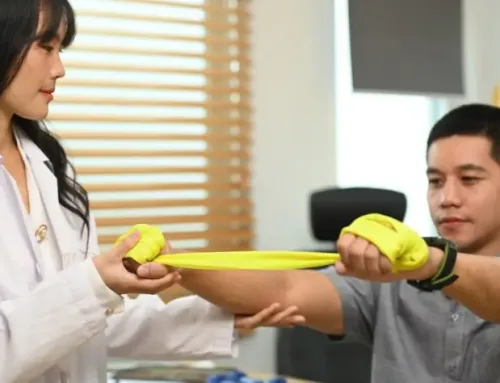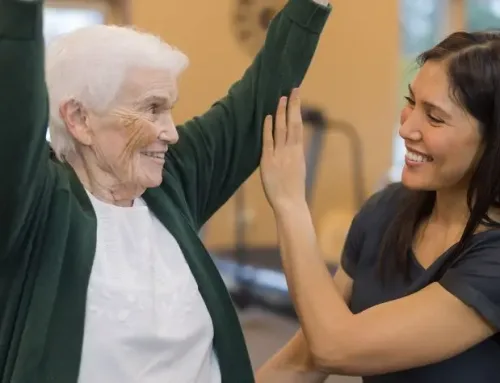MOT vs. OTD: Which Occupational Therapy Degree is Right for You?

Choosing between a Master of Occupational Therapy (MOT) and a Doctor of Occupational Therapy (OTD) can feel like a big decision, especially when both degrees lead to becoming a licensed occupational therapist (OT). If you’re eager to start practicing quickly, an MOT might seem like the fastest route. But if you’re thinking ahead—about leadership, research, or specialized roles—an OTD could set you up for long-term career growth.
When it comes to MOT vs OTD, the best choice depends on your goals. So, which degree is right for you? Let’s break it down.
MOT vs OTD: What Sets These OT Degrees Apart?
If you’re pursuing a career in occupational therapy, you’ve probably come across the choice between a Master of Occupational Therapy (MOT) and a Doctor of Occupational Therapy (OTD). Both lead to a fulfilling career as a licensed OT, but the path you choose affects how long you’re in school, your career trajectory, and future opportunities.
Length & Time Commitment
- MOT: Typically completed in 2–3 years, the MOT has traditionally been considered the quicker path to becoming a licensed OT.
- OTD: Most OTD programs take 2.5–3 years to complete, but forward-thinking universities like SCU offer accelerated hybrid pathways that allow students to earn their doctorate in just over two years—without sacrificing hands-on experience or career readiness.
Coursework & Curriculum
An MOT program focuses primarily on clinical skills and patient care, preparing students for entry-level OT roles in healthcare, education, and rehabilitation settings.
An OTD program includes all the foundational coursework of an MOT but adds advanced training in leadership, healthcare policy, and research. OTD students also complete a doctoral capstone project, which often leads to specialization, advocacy, or program development.
Key additions in an OTD curriculum include:
Leadership and Management Training
Learn how to lead teams, manage programs, and contribute to healthcare systems at the organizational level.
Healthcare Policy, Advocacy, and Systems Change
Gain the skills to influence policy, advocate for occupational justice, and drive positive change in your community and beyond.
Advanced Research and Evidence-Based Practice
Develop the ability to design, conduct, and apply research to improve outcomes and advance the profession.
Doctoral Capstone Project
Complete an in-depth project that lets you specialize in areas like telehealth, trauma relief using virtual reality, pediatrics, corporate ergonomics, or lifestyle medicine—giving you a competitive edge in emerging practice areas.
Integrated Technology Training
Experience VR therapy, 3D printing for adaptive equipment, driving simulation labs, and advanced anatomy tools that prepare you for real-world, tech-forward practice.
Career Opportunities & Advancement
Both MOT and OTD graduates can work in hospitals, outpatient clinics, rehabilitation centers, and schools, but career growth opportunities differ.
MOT Graduates:
- Qualify for entry-level OT jobs in diverse settings.
- Have opportunities for specialization but may need additional certifications or further education to advance into leadership roles.
OTD Graduates:
- Often qualify for higher-paying leadership, academic, and research positions.
- Are preferred for roles like hospital rehab directors, university faculty, and advanced clinical specialists.
- The OTD serves as an ideal bridge to PhD or research-intensive programs
For those interested in shaping the future of OT through research, policy, or teaching, an OTD is the better fit. SCU’s OTD also includes training that prepares you for additional certifications—including Physical Agent Modalities (PAM) certification and eligibility for the American College of Lifestyle Medicine (ACLM) Certification Exam—helping you graduate with specialized skills that stand out in today’s competitive job market.
Long-Term Career Growth & Future-Proofing
OTD graduates complete advanced training in leadership, research, and advocacy, giving them more opportunities to advance into higher-level positions. While the OTD is the highest clinical practice degree in occupational therapy, it can also serve as a stepping stone toward a PhD or other research-focused doctorate for those who wish to contribute to academic scholarship, policy development, or large-scale healthcare research.
High Demand, High Pay: The Rising Potential in Occupational Therapy
A Career That’s Growing Faster Than Most
If you’re looking for a career with stability, growth, and great earning potential, occupational therapy is checking all the boxes. According to the U.S. Bureau of Labor Statistics, employment of occupational therapists is projected to grow 11% from 2023 to 2033—far outpacing many other healthcare professions. This demand is fueled by an aging population, an increased focus on rehabilitation, and expanding healthcare services across the country.
In addition to strong job prospects, salaries for OTs are highly competitive. The median annual wage for occupational therapists in 2023 was $96,370, and in California, that number jumps to an impressive $111,948. With more job openings, higher pay, and opportunities to specialize in fields like neurorehabilitation, pediatric therapy, and telehealth, occupational therapy is becoming a top choice for those looking to make an impact while securing a rewarding career.
Why the Demand for OTs is Rising
- Aging Population – As the Baby Boomer generation ages, more people need rehabilitation, adaptive therapies, and injury prevention services.
- Expanding Healthcare Services – Schools, hospitals, and outpatient clinics are increasingly hiring OTs to support patient care and functional independence.
- New Specialties Emerging – From corporate ergonomics to mental health OT and assistive technology, occupational therapists are taking on exciting new roles that didn’t exist a decade ago.
A Career with Long-Term Stability and Growth
Beyond strong job prospects and competitive salaries, occupational therapy offers something many careers don’t: a sense of purpose. OTs help people adapt to disabilities and improve their quality of life in ways that are truly life-changing. Whether working in hospitals, schools, rehabilitation centers, or even private practice, the flexibility, security, and potential for career advancement make OT a profession worth considering.
So, Which Degree Is Right for You?
When comparing MOT vs OTD, the right choice depends on your career goals, timeline, and long-term ambitions. Both degrees lead to a rewarding career in occupational therapy, but they open different doors for advancement. Here’s how to determine which one fits your future best.
Choose an MOT If:
- You want to start working as soon as possible.
- You’re focused on direct patient care and not interested in leadership, teaching, or research.
- You prefer a shorter, lower-cost degree option that gets you into the field quickly.
Choose an OTD If:
- You want to future-proof your career and stay ahead of potential industry changes.
- You’re interested in leadership, teaching, research, or advanced clinical specializations.
- You want higher earning potential and opportunities to advance into management or academic roles.
No matter which degree you choose, both paths lead to a fulfilling career helping people regain independence and improve their quality of life. It’s just a matter of deciding where you see yourself in the future—and how far you want to go.
SCU’s OTD: Elevate Your Skills, Expand Your Opportunities
If you’re looking for a flexible, innovative way to earn your Doctor of Occupational Therapy (OTD), SCU’s California campus has designed a program that fits your life while preparing you for a high-impact career. Designed for those eager to step into leadership, research, and specialized OT roles, our ACOTE-accredited program prepares you for top-tier career opportunities in just over two years.
Why Choose SCU’s OTD Program?
- 80% Online Hybrid Format – Participate in live, synchronous classes led by expert faculty, giving you the flexibility of remote learning without sacrificing real-time engagement.
- Hands-On Clinical Experience – Gain real-world experience at SCU’s Academic Health Center and through supervised fieldwork placements near you.
- Advanced Learning Technology – Train with virtual reality systems, 3D printing, driving simulators, and digital anatomy tools.
- Capstone Project – Specialize in a field of interest and develop real-world solutions that can impact the profession.
The Doctor of Occupational Therapy (OTD) program at SCU builds a strong foundation in clinical practice while expanding students’ abilities in leadership, research, and specialized care. Coursework is delivered through live, interactive online sessions, supported by small class sizes and personalized faculty mentorship by academic leaders in the field that keep students engaged throughout their academic journey.
We also offer a Fixed Tuition Guarantee, so students know exactly what they’ll pay from start to finish—no hidden fees, no unexpected increases. This allows you to focus on your education and career goals without financial uncertainty.
Ready to Take the First Step in Your OT Career?
Choosing between MOT vs OTD comes down to your career goals and how far you want to take your role as an occupational therapist. Both degrees lead to licensure and clinical practice, but an OTD provides additional opportunities in leadership, research, and advanced specializations. With the field evolving, earning a doctorate can set you up for long-term success.
At SCU, our Doctor of Occupational Therapy program is built for students ready to expand their impact and career potential. If you’re looking for a flexible, forward-thinking program that prepares you for the future of OT, explore our admission requirements today and take the next step toward your OTD.
FAQs
What’s the difference between an MOT and an OTD?
An MOT (Master of Occupational Therapy) prepares you for clinical practice, while an OTD (Doctor of Occupational Therapy) includes leadership, research, and advanced training. Both lead to licensure, but an OTD offers more opportunities for specialization and career growth.
Do employers prefer OTD graduates over MOT graduates?
While both degrees qualify you to work as an OT, many employers prefer an OTD for leadership roles, specialized positions, and academic careers. The field is shifting toward doctoral-level education, similar to what happened in physical therapy.
Does SCU offer a flexible OTD program?
Yes! Our hybrid OTD program allows students to complete 80% of coursework online, with short in-person training sessions for hands-on learning. This makes it possible to earn your doctorate while balancing work and life commitments.
How long does it take to complete SCU’s OTD program?
Our OTD program takes just over two years to complete, allowing students to earn their doctorate faster than traditional programs while still gaining the clinical experience and training needed for success.
Related Posts




